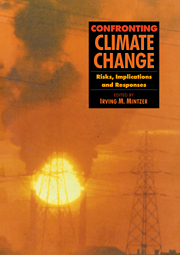Book contents
- Frontmatter
- Contents
- Foreword
- Acknowledgements
- List of Reviewers
- 1 Living in a Warming World
- I The Science of Climate Change
- II Impacts of Global Climate Change
- III Energy Use and Technology
- IV Economics and the Role of Institutions
- 15 The Economics of Near-Term Reductions in Greenhouse Gases
- 16 “Wait and See” versus “No Regrets”: Comparing the Costs of Economic Strategies
- 17 International Organisations in a Warming World: Building a Global Climate Regime
- 18 Modifying the Mandate of Existing Institutions: NGOs
- 19 Modifying the Mandate of Existing Institutions: Corporations
- 20 International Trade, Technology Transfer and Climate Change
- V Equity Considerations and Future Negotiations
- Annex I
- Annex II
- Glossary
- Index
16 - “Wait and See” versus “No Regrets”: Comparing the Costs of Economic Strategies
Published online by Cambridge University Press: 06 January 2010
- Frontmatter
- Contents
- Foreword
- Acknowledgements
- List of Reviewers
- 1 Living in a Warming World
- I The Science of Climate Change
- II Impacts of Global Climate Change
- III Energy Use and Technology
- IV Economics and the Role of Institutions
- 15 The Economics of Near-Term Reductions in Greenhouse Gases
- 16 “Wait and See” versus “No Regrets”: Comparing the Costs of Economic Strategies
- 17 International Organisations in a Warming World: Building a Global Climate Regime
- 18 Modifying the Mandate of Existing Institutions: NGOs
- 19 Modifying the Mandate of Existing Institutions: Corporations
- 20 International Trade, Technology Transfer and Climate Change
- V Equity Considerations and Future Negotiations
- Annex I
- Annex II
- Glossary
- Index
Summary
Editor's Introduction
The international debate on policy responses to the risks of rapid climate change is moving toward a climax. In the process, scientists, economists, environmentalists and decision- makers have sorted themselves loosely into two camps. One group, while cognizant of the remaining uncertainties in the science of climate change, sees critical relationships and synergisms linking this problem to other aspects of the environment/development challenge. This group sees the risks as sufficiently urgent, and the synergisms sufficiently beneficial to argue for bold initiatives now — especially those that sustain or enhance the prospects for economic development while limiting the dangers of environmental damage. This group advocates a policy strategy based on the principle of “No Regrets” — taking steps now that will pay dividends in the future, whether or not the world is on the edge of a major climate change.
The second group emphasizes the fact that scientific knowledge of the climate system is not complete. They note that current knowledge is, for example, insufficient to predict the regional distribution of future climate change with certainty. As a consequence, this group argues that hasty choices made now could impose large and uncompensated costs on human societies—or might even backfire environmentally. This group urges caution and delay—adopting a “Wait and See” strategy in which no deliberate policy actions are taken until scientific certainty about the timing, distribution, and severity of future climate change has been established.
R.K. Pachauri and Mala Damodaran take up the challenge of comparing the economic implications of these two strategies. They assess the potential impacts of global climate change on agriculture, forests and ecosystems, coastal zones, and human health.
- Type
- Chapter
- Information
- Confronting Climate ChangeRisks, Implications and Responses, pp. 237 - 252Publisher: Cambridge University PressPrint publication year: 1992



